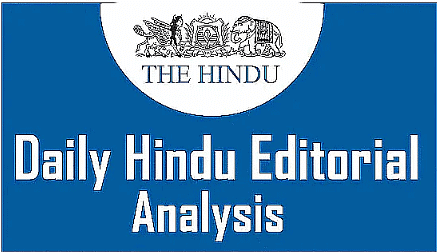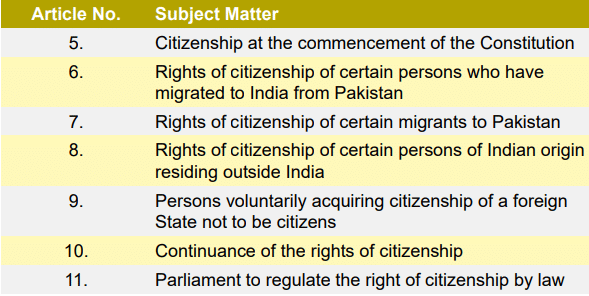UPSC Exam > UPSC Notes > Current Affairs & Hindu Analysis: Daily, Weekly & Monthly > The Hindu Editorial Analysis- 21st May 2024
The Hindu Editorial Analysis- 21st May 2024 | Current Affairs & Hindu Analysis: Daily, Weekly & Monthly - UPSC PDF Download

Critical times call for strong judicial adjudication
Why in News?
Recently, the Indian government notified the rules for the Citizenship Amendment Act (CAA), 2019, paving the way for its implementation after over 4 years since its passage by Parliament in December 2019.
- The CAA, 2019 is an Indian legislation that provides a path to Indian citizenship for migrants belonging to six religious minorities: Hindu, Sikh, Buddhist, Jain, Parsi, and Christian from Pakistan, Bangladesh, and Afghanistan.
What are the Rules Issued by the Government Concerning the Citizenship Amendment Act?
- Government Initiatives for Refugees:
- Citizenship Rules Amendments (2004): The government has previously amended citizenship rules to assist refugees.
- Notifications (2014, 2015, 2016, 2018): Additional steps were taken in these years to address refugee issues through various notifications.
- CAA Rules 2024:
- Application Process:
- Section 6B of the Citizenship Act, 1955: Applications for citizenship under the CAA must comply with this section.
- Requirements: Applicants must provide proof of their country of origin, religion, date of entry into India, and knowledge of an Indian language.
- Proof of Country of Origin:
- Relaxed Documentation Requirements: Acceptable documents include birth or educational certificates, identity documents, licenses, land records, or any document proving previous citizenship of the specified countries.
- Date of Entry into India:
- Evidence: Applicants can provide one of 20 different documents, such as visas, residential permits, census slips, driving licenses, Aadhaar cards, ration cards, government or court letters, and birth certificates.
- Application Process:
Mechanism for Implementation of Rules:
- Task Assignment:
- Ministry of Home Affairs (MHA): The MHA has designated the Postal department and Census officials to handle the processing of citizenship applications under the CAA
- Background and Security Checks:
- Central Security Agencies: These checks will be carried out by agencies like the Intelligence Bureau (IB).
Decision-Making Process:
- Empowered Committees: Each state will have a committee led by the Director (Census Operations), which will make final decisions on applications.
- Committee Composition: The committee includes officials from the IB, Post Master General, State or National Informatics Centre, and representatives from the State government’s Department of Home and Divisional Railway Manager.
District-Level Committees:
- Superintendent of the Department of Post: Heads these committees, which will review applications.
- Representative Invitee: A representative from the District Collector’s office will participate as an invitee.
Processing of Applications:
Empowered Committee and District Level Committee (DLC):
- Role of DLC: Responsible for receiving applications.
- Final Decision: The Empowered Committee, headed by the Director (Census Operations), will make the final decision on applications, bypassing state control.
What is the Citizenship Amendment Act, 2019?
- Citizenship in India: Citizenship is the legal status and relationship between an individual and a state that entails specific rights and duties.
- Citizenship in India is listed in the Union List under the Constitution and thus is under the exclusive jurisdiction of Parliament.
- The Constitution of India, on 26th January, 1950, established categories of people eligible for Indian citizenship.
- It also granted Parliament the authority to regulate additional aspects of citizenship, such as granting and renunciation.
- Under this authority, Parliament enacted the Citizenship Act, 1955.
- The Constitution of India, on 26th January, 1950, established categories of people eligible for Indian citizenship.
- The Act specifies that citizenship may be acquired in India through five methods: by birth in India, by descent, through registration, by naturalisation (extended residence in India), and by incorporation of territory into India.
- Children born in India to ambassadors are not eligible for Indian citizenship based solely on their birth in the country.
- Citizenship in India is listed in the Union List under the Constitution and thus is under the exclusive jurisdiction of Parliament.

Objective of the Amendment:
- The Citizenship Act, 1955 was amended in 2019 to facilitate citizenship for Hindu, Sikh, Buddhist, Jain, Parsi, or Christian migrants from Pakistan, Bangladesh, and Afghanistan.
Eligibility Criteria:
- Migrants who entered India on or before 31st December 2014 and suffered "religious persecution or fear of religious persecution" in their country of origin are eligible for accelerated citizenship under the amendment.
Legal Exemptions:
- The amendment exempts these migrants from any criminal cases under:
- Foreigners Act, 1946: Pertaining to illegal entry and stay in India.
- Passport Act, 1920: Relating to overstaying visas or permits.
- The amendment exempts these migrants from any criminal cases under:
Relaxations in Naturalization Requirements:
- Citizenship Act, 1955 Requirements:
- Typically, applicants must have resided in India for the last 12 months and for 11 of the previous 14 years.
- 2019 Amendment Relaxations:
- For the specified six religions and three countries, the residency requirement is reduced from 11 years to 6 years.
- Citizenship Act, 1955 Requirements:
Regional Exemptions:
- Sixth Schedule Areas:
- The CAA does not apply to Tribal Areas in Assam, Meghalaya, Tripura, and Mizoram as mentioned in the Sixth Schedule of the Indian Constitution.
- Inner Line Permit (ILP) System:
- Areas covered by the ILP system are also exempt from the CAA.
- The ILP is a travel document required to enter and stay in certain protected areas, aimed at preserving the indigenous communities of the North-Eastern region.
- Currently, the ILP is required for Arunachal Pradesh, Mizoram, and Nagaland.
- Sixth Schedule Areas:
Exclusion Rationale:
- The exclusions are intended to protect the interests of tribal and indigenous communities in the North-Eastern region.
- Residents in these areas are not eligible for citizenship under the CAA, 2019, to ensure the demographic balance and cultural preservation of these communities.
What are the Concerns Related to the CAA, 2019?
- Constitutional Challenge: Critics argue that it violates Article 14 of the Indian Constitution, which guarantees the right to equality before the law and prohibits discrimination based on religion.
- The CAA's provision of granting citizenship based on religion is seen as discriminatory.
- Potential for Disenfranchisement: The CAA is often linked to the National Register of Citizens (NRC), a proposed nationwide exercise to identify illegal immigrants.
- Critics fear that a combination of CAA and a faulty NRC could disenfranchise several citizens who are unable to prove their documentation.
- More than 19.06 lakh people were left out of the final draft of the Assam NRC released in August 2019.
- Critics fear that a combination of CAA and a faulty NRC could disenfranchise several citizens who are unable to prove their documentation.
- Impact on Assam Accord: In Assam, there is a specific concern regarding the compatibility of the CAA with the Assam Accord, 1985.
- The Accord established criteria for determining citizenship in Assam, including specific cut-off dates for residency.
- The CAA's provision of a different timeline for granting citizenship could conflict with the provisions of the Assam Accord, leading to legal and political complications.
- Secularism and Social Cohesion: The CAA's focus on religion as a criterion for citizenship eligibility has raised broader concerns about its impact on secularism and social cohesion in India.
- Critics argue that privileging certain religious communities over others undermines the secular principles upon which the Indian state was founded and could exacerbate communal tensions.
- Exclusion of few Religious Communities: The exclusion of certain religious communities from the CAA and its subsequent rules, such as Sri Lankan Tamils and Tibetan Buddhists, who faced religious persecution in their home countries, raises concerns.
Way Forward
- Inclusive Refugee Policy: There is a need to develop a more inclusive refugee policy of India in lines with the UN Refugee Convention that does not discriminate based on religion, ethnicity, or any other arbitrary criteria.
- Also, ensuring that citizenship laws prioritise principles of equality and non-discrimination, providing equal opportunities for all individuals regardless of their background.
- Documentation Assistance: Implement measures to assist individuals, particularly marginalised communities, in obtaining necessary documentation to prove their citizenship status.
- Provide support services and resources to help individuals navigate the citizenship verification process, thereby mitigating the risk of statelessness.
- Stakeholder Engagement and Dialogue: Facilitating meaningful dialogue and consultation with civil society organisations, religious leaders, and communities against it to address grievances and concerns related to the CAA.
- International Engagement: Engaging with neighbouring countries, particularly Pakistan, Afghanistan, and Bangladesh, to address concerns related to religious persecution and human rights violations.
- India should also work towards regional cooperation and diplomatic initiatives aimed at promoting religious freedom and tolerance.
- Educational and Awareness Campaigns: Conducting educational and awareness campaigns to disseminate accurate information about citizenship laws and dispel misinformation or misconceptions.
- Promoting public understanding of the principles of equality, secularism, and inclusivity enshrined in the Indian Constitution.
The document The Hindu Editorial Analysis- 21st May 2024 | Current Affairs & Hindu Analysis: Daily, Weekly & Monthly - UPSC is a part of the UPSC Course Current Affairs & Hindu Analysis: Daily, Weekly & Monthly.
All you need of UPSC at this link: UPSC
|
63 videos|5407 docs|1145 tests
|
FAQs on The Hindu Editorial Analysis- 21st May 2024 - Current Affairs & Hindu Analysis: Daily, Weekly & Monthly - UPSC
| 1. How can strong judicial adjudication help during critical times? |  |
Ans. Strong judicial adjudication can help during critical times by ensuring that laws are upheld, rights are protected, and justice is served. Judges can make decisions that uphold the rule of law and protect the rights of individuals, even in times of crisis.
| 2. Why is strong judicial adjudication important in times of crisis? |  |
Ans. Strong judicial adjudication is important in times of crisis because it provides a check on government power, ensures accountability, and upholds the rights of individuals. Judges can review government actions, protect civil liberties, and ensure that the rule of law is upheld.
| 3. How can the judiciary play a role in maintaining stability during critical times? |  |
Ans. The judiciary can play a crucial role in maintaining stability during critical times by providing a forum for resolving disputes, upholding the rule of law, and ensuring that government actions are constitutional. Judges can make decisions that help to maintain order and protect the rights of individuals.
| 4. What are some examples of strong judicial adjudication during past crises? |  |
Ans. Some examples of strong judicial adjudication during past crises include court decisions that upheld civil liberties during wartime, protected the rights of marginalized groups during times of social unrest, and ensured that government actions were lawful and constitutional.
| 5. How can citizens support strong judicial adjudication during critical times? |  |
Ans. Citizens can support strong judicial adjudication during critical times by respecting the independence of the judiciary, advocating for the rule of law, and holding government officials accountable. By participating in the legal system, staying informed, and advocating for justice, citizens can help to ensure that the judiciary remains strong during times of crisis.
Related Searches















